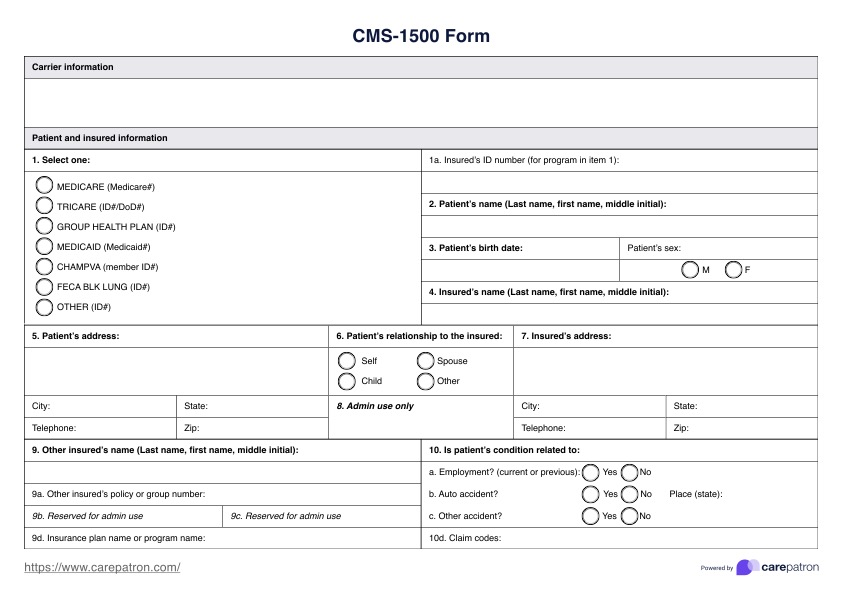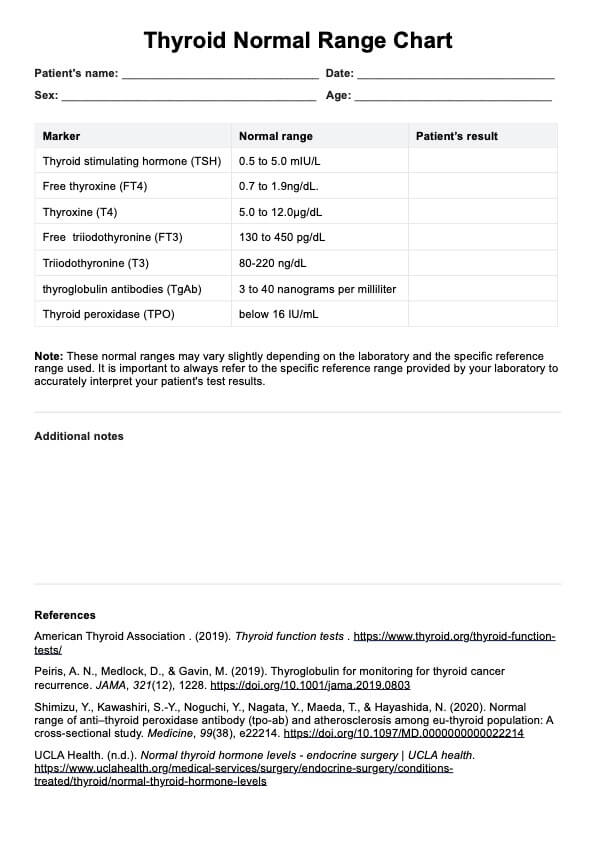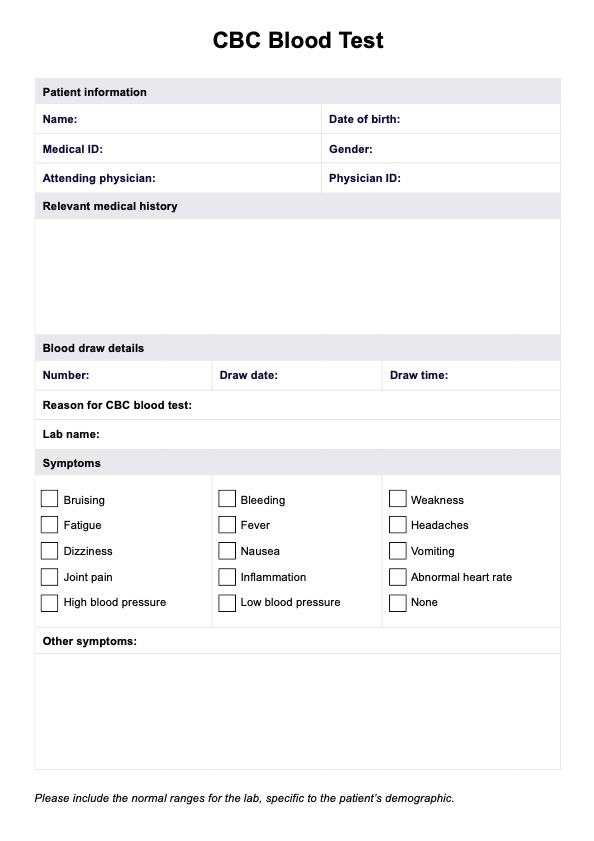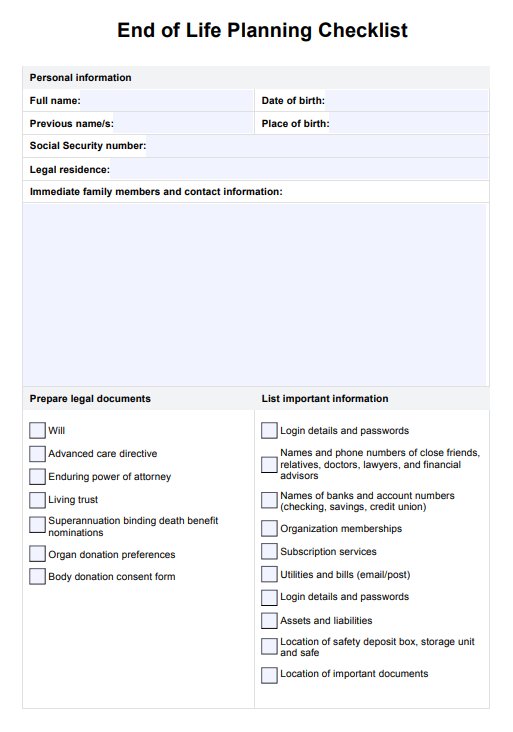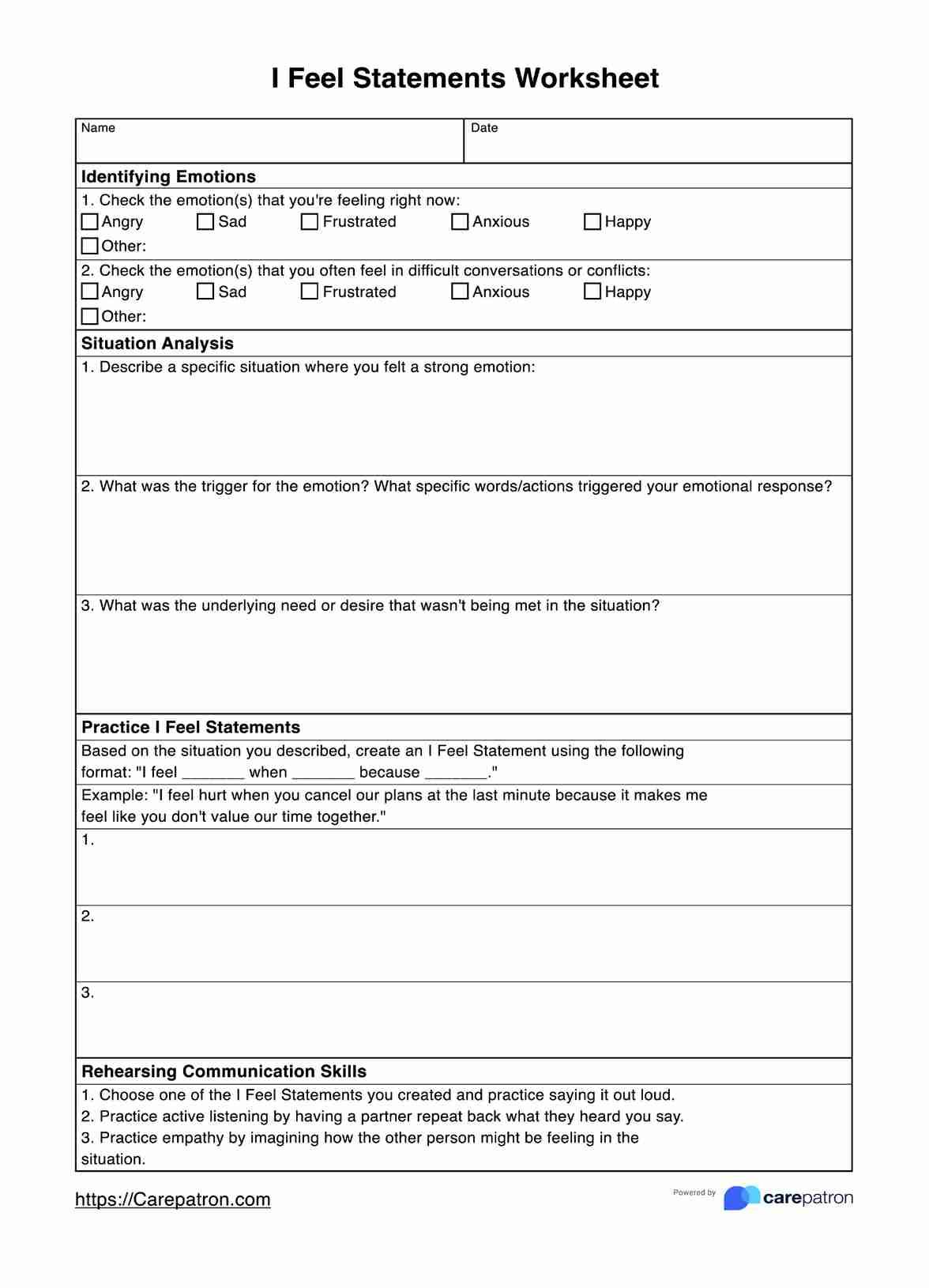Stinking Thinking Worksheet
Download our Stinking Thinking Worksheet to help clients challenge negative thoughts and cognitive distortions.


What are cognitive distortions?
Negative thoughts are a natural part of human experience, but when they persist and become ingrained in our thinking patterns, they have the potential to disrupt our everyday lives.
Cognitive distortions, often fueled by these persistent negative thoughts, are like tinted lenses through which we perceive ourselves, our circumstances, and our interactions. They skew our reality, coloring our self-image, our evaluations of daily events, our relationships, and our interpretations of others' behaviors.
These distorted thoughts, if left unchallenged, can significantly impact mental health, leading to conditions like depression and anxiety. The cumulative effect of these distorted perceptions can create a pervasive sense of hopelessness, worthlessness, and inadequacy, undermining one's ability to function optimally in one's day-to-day life.
Stinking Thinking Worksheet Template
Stinking Thinking Worksheet Example
What is stinking thinking?
"Stinking Thinking" refers to a negative pattern of thought characterized by beliefs that one is destined to fail, that misfortune is inevitable, or that one lacks inherent worth. This term, also recognized as Cognitive Distortions in mental health expertise, encapsulates a range of detrimental thought processes that can lead to distress and hinder personal growth. These distorted cognitions often manifest as exaggerated or irrational interpretations of oneself, events, and the world, perpetuating a cycle of pessimism and self-doubt.
Mental health specialists use the concept of cognitive distortions to identify and address these destructive thinking patterns, aiming to empower individuals to challenge and reframe their negative beliefs, thereby fostering healthier perspectives and behaviors.
What is a Stinking Thinking Worksheet?
A Stinking Thinking Worksheet is a structured tool designed to help individuals identify, examine, and challenge their negative thought patterns, known as cognitive distortions. It typically involves identifying negative thoughts, evaluating the evidence supporting those thoughts, challenging their validity, and reframing them into more realistic and positive alternatives.
This worksheet is a practical resource for promoting self-awareness, cognitive restructuring, and fostering healthier perspectives, ultimately aiding in managing emotions and improving overall well-being.
How to use our Stinking Thinking Worksheet template
Follow these steps to effectively use our Stinking Thinking Worksheet and help clients confront and overcome negative thought patterns:
Encourage self-awareness
Assist clients in developing a deeper understanding of their thought patterns by encouraging them to observe their thoughts and emotions without judgment. Help them recognize the impact of negative thoughts on their feelings and behaviors.
Explore triggers
Guide clients in identifying situations or triggers that evoke their negative thoughts. Explore these triggers' underlying emotions and beliefs to uncover patterns and themes.
Practice critical thinking
Help clients develop critical thinking skills by encouraging them to question the validity of their negative thoughts. Assist them in examining the evidence supporting these thoughts and exploring alternative interpretations of the situations they encounter.
Facilitate reframing
Support clients in reframing their negative thoughts into more balanced and constructive perspectives. Guide them in challenging negative self-talk and replacing it with affirming statements. Assist them in identifying opportunities for growth and focusing on their strengths.
Create a safe environment
Foster a therapeutic environment characterized by trust, empathy, and acceptance. Ensure clients feel safe and supported as they explore their thoughts and emotions, free from judgment or criticism.
Ask probing questions
Use open-ended and thought-provoking questions to help clients delve deeper into their thought patterns. Encourage reflection and self-exploration by asking questions that challenge assumptions and promote insight.
Benefits of using this worksheet
Using the Stinking Thinking Worksheet offers several benefits, including:
- Promotes positive thinking: By guiding individuals to identify and challenge negative thought patterns, the worksheet encourages the development of more optimistic perspectives on life.
- Facilitates cognitive restructuring: The worksheet helps individuals engage in cognitive restructuring by analyzing and reframing negative thoughts, essential for promoting healthier thinking habits and reducing irrational thoughts.
- Enhances daily life: By addressing negative thought patterns that may be impacting various aspects of daily life, such as work, relationships, and self-esteem, the worksheet supports individuals in navigating challenges more effectively and improving their overall well-being.
- Alleviates depression: The worksheet can be a valuable tool in the treatment of depression, as it empowers individuals to challenge negative thinking patterns that contribute to depressive symptoms and fosters a more positive outlook on life.
- Makes learning fun: For children, the Stinking Thinking Worksheet can be an engaging and interactive way to learn about managing emotions and developing resilience. Through playful exercises and activities, children can learn valuable lessons about the power of positive thinking.
- Serves as a first step: The worksheet serves as an accessible starting point for individuals who are beginning to address their negative thought patterns. It provides a structured framework for self-reflection and empowers individuals to take proactive steps toward improving their mental health.
- Teaches essential lessons: By guiding individuals through challenging and reframing negative thoughts, the worksheet teaches valuable lessons about resilience, self-awareness, and emotional regulation.
Adopting this cognitive distortions template can boost your practice and client outcomes. This tool enables clients to formulate actionable plans for their progress.
Commonly asked questions
Various factors can influence stinking thinking, including past experiences, cognitive biases, and learned behaviors.
Yes, stinking thinking can contribute to negative emotions, low self-esteem, and mental health issues if left unchecked.
With practice and effort, individuals can learn to recognize and challenge their stinking thinking patterns, leading to more positive and adaptive thought processes.


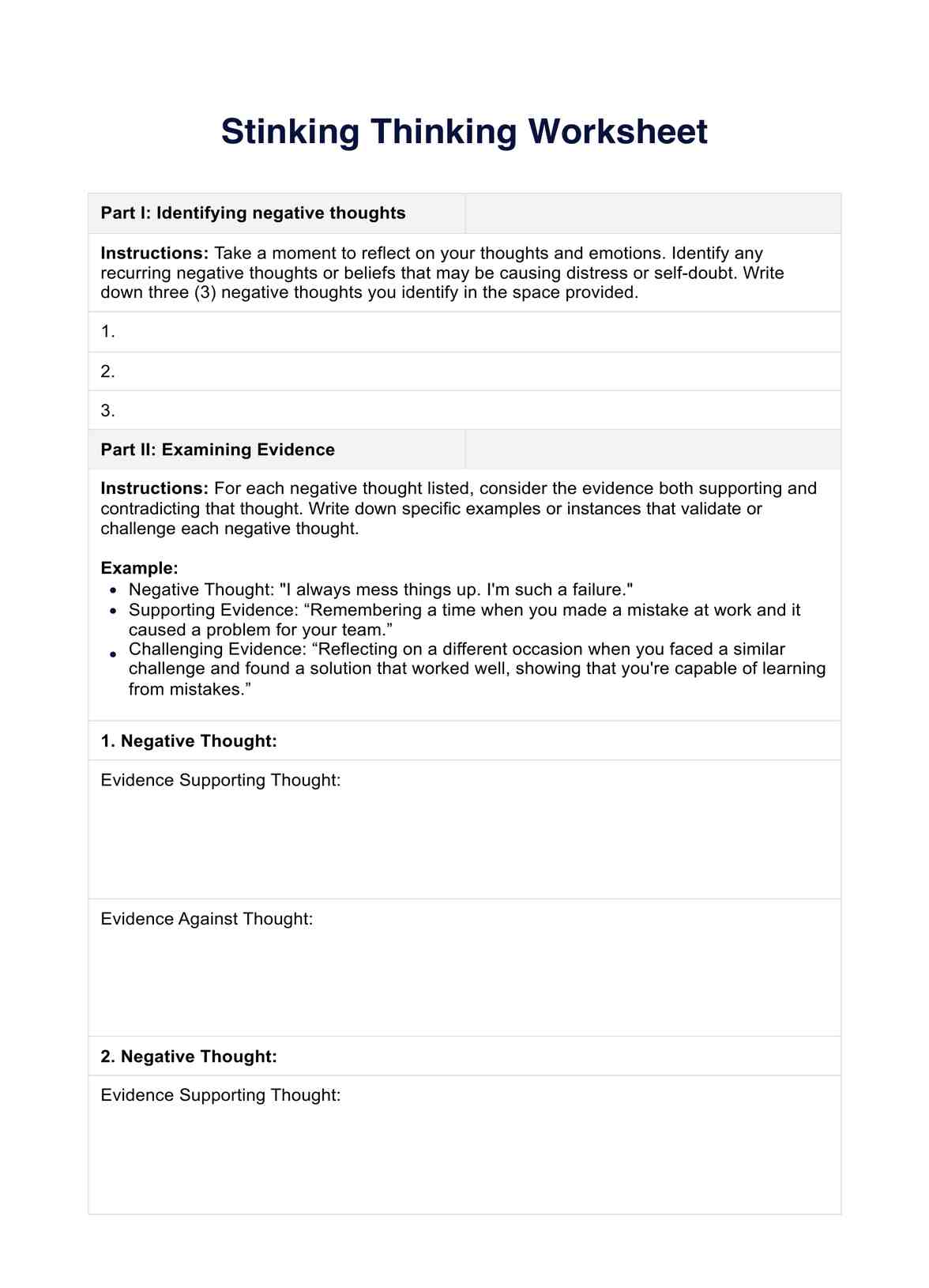
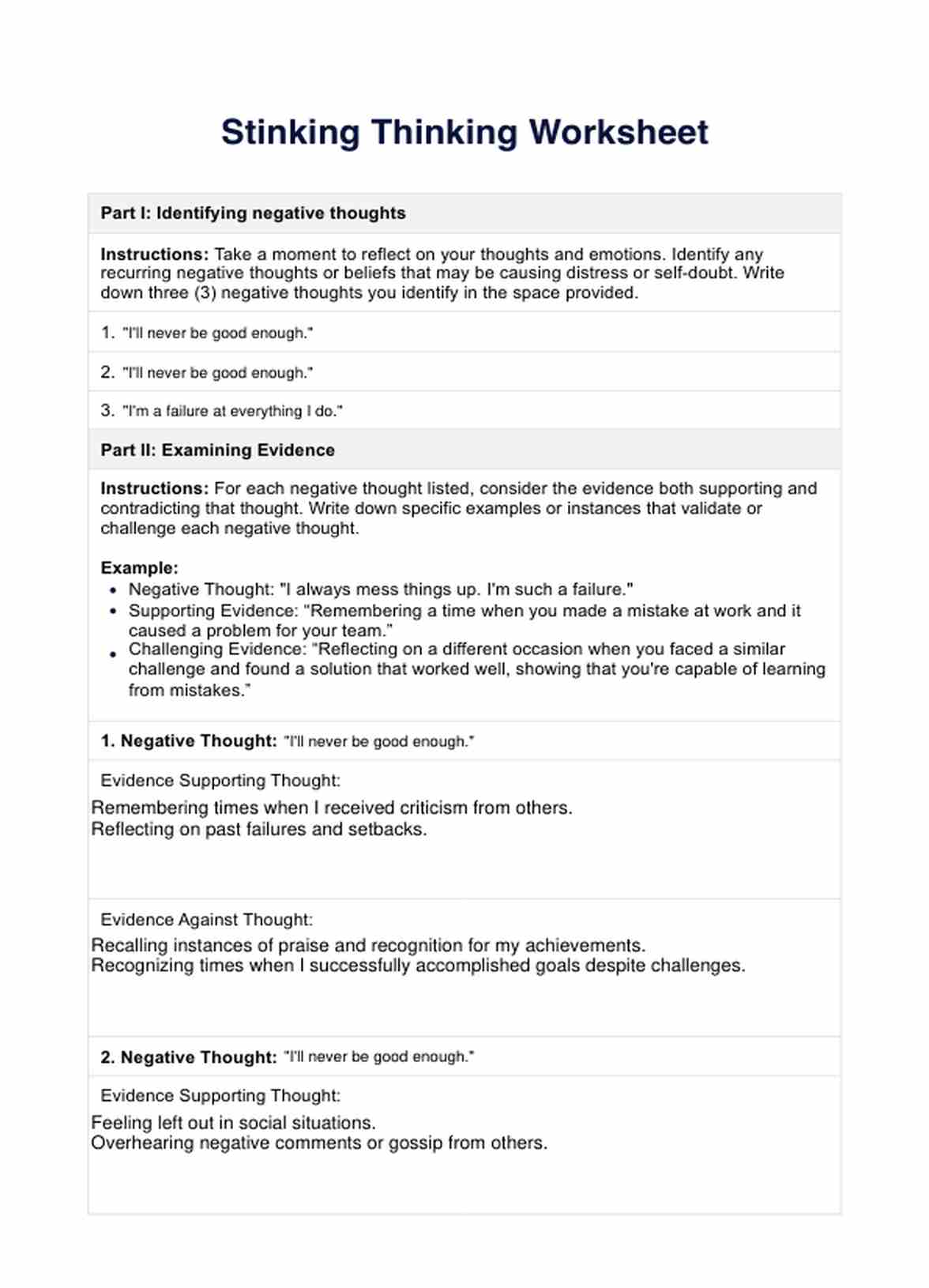





















-template.jpg)














































































